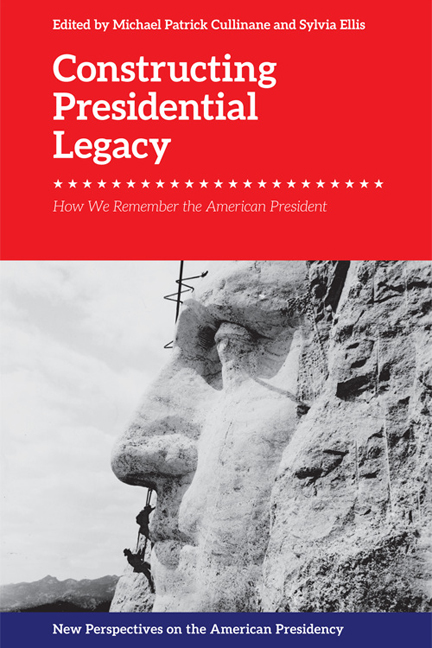Book contents
- Frontmatter
- Contents
- Acknowledgments
- Notes on Contributors
- An introduction to Presidential Legacy
- 1 Presidential Temples: America’s Presidential Libraries and Centers from the 1930s to Today
- 2 Presidential Legacy: A Literary Problem
- 3 Pennsylvania Avenue meets Madison Avenue: The White House and Commercial Advertising
- 4 Eisenhower’s Farewell Address in History and Memory
- 5 Pageantry, Performance, and Statecraft: Diplomacy and the Presidential Image
- 6 “You’ve got to decide how you want history to remember you”: The legacy of Lyndon B. Johnson in film and Television
- 7 The Farewell Tour: Presidential Travel and Legacy Building
- 8 Reflecting or Reshaping?: Landmark Anniversaries and Presidential Legacy
- 9 From a “New Paradigm” to “Memorial Sprawl”: The Dwight D. Eisenhower Presidential Memorial
- 10 Top Trumps: Presidential Legacies, New Technologies, and a New Generation
- Epilogue: Confessions of a Presidential Biographer
- Index
Epilogue: Confessions of a Presidential Biographer
Published online by Cambridge University Press: 01 May 2021
- Frontmatter
- Contents
- Acknowledgments
- Notes on Contributors
- An introduction to Presidential Legacy
- 1 Presidential Temples: America’s Presidential Libraries and Centers from the 1930s to Today
- 2 Presidential Legacy: A Literary Problem
- 3 Pennsylvania Avenue meets Madison Avenue: The White House and Commercial Advertising
- 4 Eisenhower’s Farewell Address in History and Memory
- 5 Pageantry, Performance, and Statecraft: Diplomacy and the Presidential Image
- 6 “You’ve got to decide how you want history to remember you”: The legacy of Lyndon B. Johnson in film and Television
- 7 The Farewell Tour: Presidential Travel and Legacy Building
- 8 Reflecting or Reshaping?: Landmark Anniversaries and Presidential Legacy
- 9 From a “New Paradigm” to “Memorial Sprawl”: The Dwight D. Eisenhower Presidential Memorial
- 10 Top Trumps: Presidential Legacies, New Technologies, and a New Generation
- Epilogue: Confessions of a Presidential Biographer
- Index
Summary
One can write about American presidents historically without writing biographies. In fact, most presidential historians do not write biographies, preferring episodic accounts and policy-oriented analyses. But some do write biographies, for one or more of the following reasons.
First, biographies sell. This is no small thing. Many people develop an aversion to history, as history, in school. Perhaps their teachers are uninspiring; perhaps young people simply tend to look forward rather than back. But the result is a widespread belief that history is a dry collection of dates and facts. Biographies, by contrast, deal with living, breathing people—or people who were once living and breathing. Biography, of all the genres of historical nonfiction, is the one that most closely approximates the novel. It has a protagonist and often antagonists. Its characters speak, through letters, diaries, and other primary materials. The chore of the biographer is quite similar to that of the novelist: to place readers inside the head of another person. The result is that many people who would not think of picking up a history book are happy to read lives of important and interesting figures.
Second, presidents justify biographical treatment more than some other historical figures. A common critique of presidential biographies is that they tend to confirm the great man theory of history. And so they do. But if there are any great men in history, presidents are among the likeliest suspects. Presidents are more important than other people because their actions have large consequences. This is not a moral evaluation; it is simply a statement of fact. Historians, including biographers, seek to explain how the world has become the way it is. Insights into presidential minds and hearts provide greater leverage in this explanatory process than similar insights into people who wield less power.
Third, presidents generate profuse historical records. And these are generally preserved and made available to researchers. Governors, senators, business leaders, actors, athletes, and other celebrities also generate records, but the number of these records is typically smaller, their collection and preservation is more haphazard, and their accessibility to researchers is far from guaranteed. People who never achieve renown sometimes generate records, but these usually disappear before or after the death of the generator.
- Type
- Chapter
- Information
- Constructing Presidential LegacyHow we Remember the American President, pp. 277 - 283Publisher: Edinburgh University PressPrint publication year: 2018



